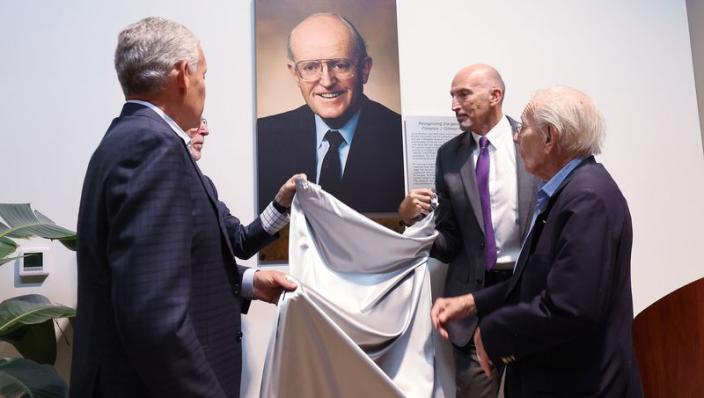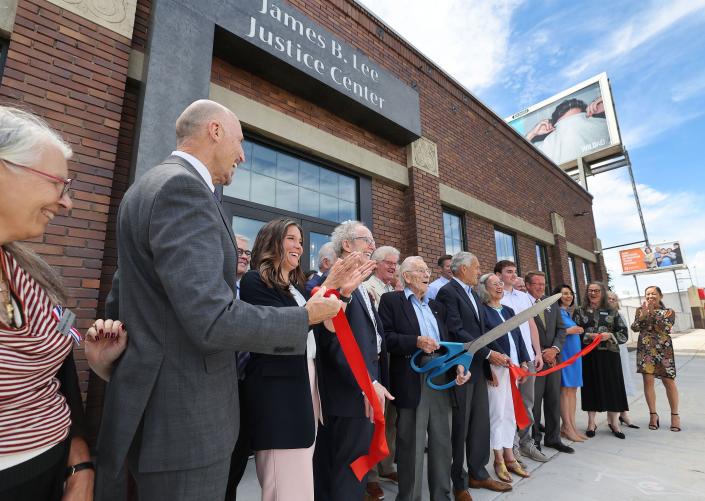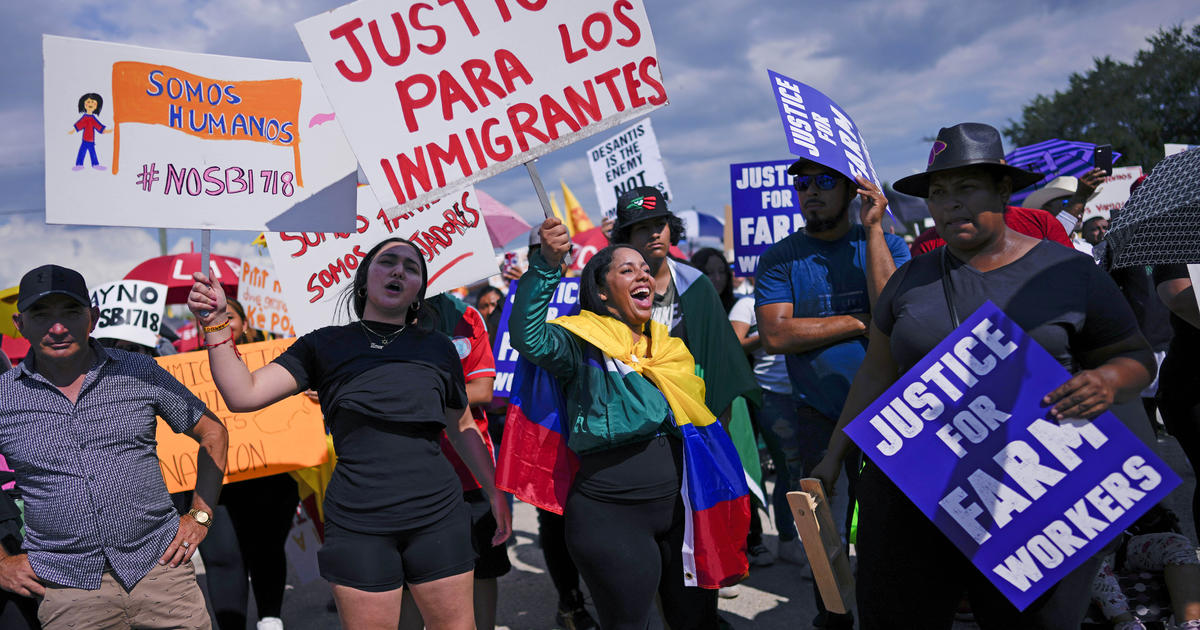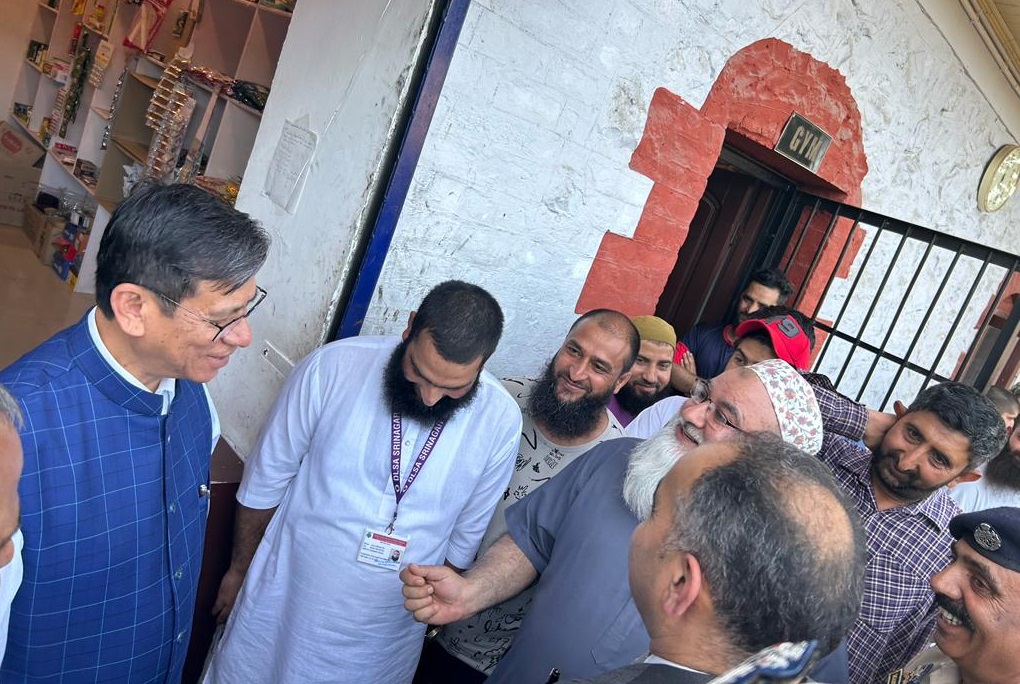legal services
California to offer free legal aid to undocumented farm workers
SACRAMENTO – California farm workers in state labor investigations will soon be able to access free legal services to safely report bad-acting employers, Gov. Gavin Newsom said Wednesday.
In efforts to prevent labor exploitation, a new $4.5 million pilot program will ensure farmworkers can fend for their rights despite their immigration status with free case review services, legal advice and attorney representation.
An estimated 50 percent of California’s farm workers are undocumented, which leaves the workforce vulnerable to bad acting employers and disproportionately unlikely to report labor claims, said Newsom’s office.
Newsom said that the program will provide more tools for farmworkers, so they no longer have to worry about the fear of deportation or the difficulty of finding work without work authorization during cases of exploitation.
“Farmworkers are the backbone of our economy and we won’t stand by as bad actors use the threat of deportation as a form of exploitation,” said Newsom in a statement. “In the absence of Congress modernizing our broken, outdated immigration system, California continues our efforts to support immigrant families.”
Since 2015, California has funded free legal immigration services through nonprofit partnerships. The California Labor & Workforce Development and the California Department of Social Services, which will oversee the pilot, will utilize existing resources to launch the program later this year.
To be eligible, farmworkers must be involved in cases under review by the Department of Industrial Relations’ Labor Commissioner’s Office, the Division of Occupational Safety and Health or the Agricultural Labor Relations Board. Services will be available based on capacity and population estimates.
“The time is now for us to ensure that immigrant labor rights are upheld and respected. We recommend the state to support this pilot, which will help ensure that legal services are available and accessible through partnerships with trusted community-based
Chief Justice Visits Central Jail Srinagar, Assesses Quality Of Legal Aid Services For Prisoners – Jammu Kashmir Latest News | Tourism
SRINAGAR, Jul 13: Chief Justice, High Court of Jammu & Kashmir and Ladakh and Patron-in-chief, J&K Legal Services Authority, Justice N. Kotiswar Singh today visited the Central Jail here to assess the conditions of the prisoners and the quality of legal aid services being provided to them.
The Chief Justice was accompanied by his Principal Secretary, MK Sharma and Member Secretary of J & K Legal Services Authority, Amit Gupta.
On arrival to Central Jail, the Chief Justice was received by the Director General of Prisons, J & K, Deepak Kumar and DLSA Srinagar Chairman Jawad Ahmed. Superintendent of Central Jail Srinagar, Daljit Singh; SP North Zone Srinagar, Raja Zuhaib and other officers of Central Jail Srinagar were also present on the occasion.
The Chief Justice, upon his arrival, was also accorded ceremonial guard of honor by the contingent of CRPF deployed at the Central Jail.
During the visit, the Chief Justice had a round of all the barracks and interacted extensively with the inmates and patiently listened to their grievances and concerns. The Chief Justice assured the inmates that their genuine grievances shall be redressed and also issued on spot instructions to the concerned to ensure that the grievances projected by the inmates are addressed at the earliest.
During the visit, the Chief Justice engaged in constructive discussions with prison officials, legal aid volunteers, and inmates of Central Jail Srinagar. During interaction all the jail inmates admitted that they are being represented in the respective courts either by the counsel engaged by them or by counsel provided by the respective District Legal Services Authorities, where ever their cases are pending.
To gauge the effectiveness of the VC facility available in the Central Jail, the Chief Justice directed the jail authorities to connect with the District Court of Srinagar and
The state budget gives one-time boost to programs that give poor Mainers legal aid in civil cases
The newly signed state budget includes a one-time $4 million boost for a program that provides low-income Mainers with legal representation in civil cases – a big addition to the baseline $650,000 the program currently receives each year.
But the funding in the budget is significantly less than what the Legislature approved. Lawmakers passed a bill, sponsored by Anne Carney, D-Cape Elizabeth, that called for an $11 million investment over two years and an ongoing appropriation of $7.8 million a year – and was projected to help an estimated 10,000 additional Mainers.
Carney, an attorney who used to volunteer with a nonprofit that provides legal services, said she was pleased that her bill received funding, even though increasing the baseline funding would offer more stability to people needing legal help.
The need in Maine is great.
The National Center for Access to Justice recommends a ratio of at least 10 legal aid attorneys per 10,000 people living below 200% of the federal poverty line, but Maine averages less than two.
Steady funding would make a big difference, Carney said.
“I think the goal is to continue to add to the baseline, so we can get closer to that national justice index standard and make sure that we have high-quality representation for Mainers in civil legal matters,” she said.
While much attention has been paid to the state’s failure to provide constitutionally mandated legal services to low-income residents accused of crimes, advocates say a larger number of low-income residents need help when dealing with civil matters.
Unlike in criminal cases, there is no law in Maine that guarantees access to an attorney for civil matters. But advocates say that doesn’t make civil legal aid less important.
The additional funding is expected to allow non-profit legal clinics to help more low-income
Demand for free civil legal aid in Michigan outweighs attorneys

Kelisha Williams has been trying to get a divorce for five years and said it has been a long and expensive endeavor.
Last fall, when a car accident left her unable to work and without steady income, she couldn’t afford a lawyer.
The cost for legal representation, according to estimates Williams received: between $8,000 to $10,000. But earlier this year, a 3rd Circuit Court judge referred her to the William Booth Legal Aid Clinic — the Salvation Army’s only free legal service provider in the world, serving low-income metro Detroit residents — and she’s now hopeful she’ll get to a resolution. The 47-year-old Detroiter said it was a relief the court told her about the clinic because otherwise she likely would have been waiting for someone to call her back or tell her they’re not accepting clients.
“It wasn’t hard to find them. It was just hard to get someone to help you,” Williams told the Free Press on a Thursday in June as she waited at the clinic for help on default paperwork to proceed with the divorce. It was the first day the organization opened its in-person clinic after three years of over-the-phone and virtual services throughout the COVID-19 pandemic.

The phone at the William Booth Legal Aid Clinic constantly rings, clinic director Amy Roemer said. The nonprofit has to turn people away when it is booked with clients. It’s a similar story at other legal aid organizations across the state. More than 1.7 million low-income Michiganders qualify for civil legal aid, however there is only one available attorney for every 5,401 eligible residents, according to the Michigan State Bar Foundation. Legal aid groups say the demand for free housing, family and consumer finance services far outweighs the available funding.
“We’ve never been funded at a level to
Hopes legal aid funding review will deliver equal justice

Attorney-General Mark Dreyfus has announced a review of the National Legal Assistance Partnership. Photo: Anna Carlisle.
Overburdened legal aid centers across the country will be hoping the latest review of government funding arrangements delivers on their promises to ensure all Australians have equal access to the law.
Don’t hold your breath. Funding is never enough, as any legal aid lawyer will tell you.
Federal Attorney-General Mark Dreyfus last week announced an independent review of the National Legal Assistance Partnership, a funding agreement between all Australian governments to provide the most vulnerable access to legal assistance for civil matters, such as family law disputes and child protection.
State and territory governments fund most criminal law matters.
A decade or more of chronic underfunding by all governments for legal aid services has recently forced Aboriginal legal aid services in NSW and Queensland to suspend services.
The National Aboriginal and Torres Strait Islander Legal Service (NATILS) says demand for legal services has increased by 100 per cent since 2018, but federal government core funding has declined in real terms.
An emergency injection of $21 million in federal government funding in May would “do little more than help keep the lights on”, NATILS said.
“We fully expect service freezes to continue and that means bad outcomes for Aboriginal and Torres Strait Islander Australians, including unjust incarceration and separated families,” NATILS chair Karly Warner said.
The ACT Government has just delivered a $2 million boost for community legal services within the budget, including for the NSW/ACT Aboriginal Legal Service, which Ms Warner leads. In the ACT, its services continue.
A longer-term boost to national funding for legal aid services is at least another year away.
The current national funding agreement is due to expire in 2025. Since 2020, it will have delivered $2.4 billion in
Guyon Saunders Resource Center receives kiosk for free legal services, resources
AMARILLO, Texas (KAMR/KCIT) – According to an announcement from the Texas Legal Services Center, Amarillo’s Guyon Saunders Resource Center has become home to one of the state’s first virtual court kiosks aimed at providing free legal services to community members.
The TLSC described that the kiosk is part of a statewide pilot project, the Virtual Court Access Project, intended to improve low-income Texans’ ability to receive free legal services with accessibility, physical virtual court kiosks acting as legal aid centers in high-traffic locations.
In Amarillo, for example, the Guyon Saunders Resource Center already stands as a major community center for referrals, housing assistance, transportation assistance, legal aid, and other free resources. Its participation in the pilot program appears set to further expand its already-standing legal aid services.
Executive director of Guyon Saunders Resource Center Will Grant said a lot of clients at the center are unaware of the resources and options that they have and having the virtual court kiosk allows the clients to be aware of all of it.
“You need to know what options you have out there legally. For some of our clients, they may think that they don’t have any options when it comes to legal services. But they do. There are lawyers out there who will help them pro bono a lot of times,” said Grant. “It helps him to appear through court appearances, because a lot of these guys don’t have transportation to get down to Potter or Randall County.”


The grant added that he hopes with this program the clients of the center will be able to begin the process of moving forward in their lives.
“My prayer is that they will be able to find
Why legal aid matters | opinion

When I speak to civic groups about Alpine Legal Services, I’m surprised how many people have heard of us but aren’t sure what we do.
People also tell me they don’t realize the right to legal representation applies mostly to criminal cases. They didn’t know that those facing a life-altering civil legal matter — an eviction, a protection order from abuse and violence, a custody case, an emergency guardianship — are most often not entitled to an attorney. That’s where civil legal aid comes in. That’s what we do.
Alpine Legal Services has been around in one form or another since 1987. A group of lawyers saw the need to uphold justice for people who had strong cases but didn’t know how to present them and couldn’t afford to hire an attorney. They saw people walking away from our justice system feeling powerless and resentful. They realized that if you want to live in a safe and stable community, you can’t have people thinking our system of justice is not for them. They knew a true system of justice required not only fair and impartial judges, but advocates on both sides, to get to the truth and uphold the law, regardless of someone’s ability to pay a lawyer, or social status.
Right now, you can think of Alpine Legal Services as an emergency room for legal aid. We get more requests for aid than we can handle, so our necessary and calculated response is to triage the most critical civil legal aid cases and help get people stabilized. We are short-staffed (spoiler alert: legal aid attorneys who can afford to live in our area are not easy to come by), so our main criteria for meeting with a client at this time is whether someone is at risk of
New York City Council members urge city to increase legal services funding – JURIST
A majority of New York City Council members on Monday sent a letters to Mayor Eric Adams urging him to drastically increase funding for legal aid services in the city. 26 of the 51 councilors signed the letter requesting $195 million as a “first step in addressing the economic crisis facing these critical programs.”
The letter, authored by Councilperson Shaun Abreu, a former tenant rights attorney, referenced several issues facing legal services in the city. He called for increased homicide representation. violet crime in the city, while steadily decreasing, is still experiencing a major increase since 2019. He also called for expanded legal housing assistance. Evictions and other housing issues have grown dramatically since the expiration of COVID-19 housing protections. Legal aid attorneys have been forced to turn down 10,000 housing cases since January 2022 due to the lack of resources.
Most significantly, the letter cites the need to increase public defender and legal aid attorney salaries to address “unprecedented attrition.” According to the New York Public Defender Association the average salary for a public defender position in New York is between $69,000 and 75,000, annually. Salaries in New York City are generally higher. However, the average asking york-citys-executive-budget-for-fiscal-year-2024-and-financial-plan-for-fiscal-years-2023-2027/”rent of a one bedroom apartment in the city is $3,350 per month and increasing. Plus, the American Bar Association estimates the average debt of a graduating law student at $150,000. This combination of factors has resulted in attorneys seeking higher paying jobs, moving to another location or leaving the profession altogether.
Adams recently called for more legal aid funding while with New York Governor Kathy Hochul. New York announced $40 million in its 2024 budget for the Homeowner Protection Program. The programs provide funding to dozens of nonprofit housing counseling and legal services organizations around the state to
New justice center to provide civil legal resources for at-risk Utahns

A justice center combining three law agencies opened in Salt Lake City Thursday, offering a centralized way to provide legal counsel to Utah’s most vulnerable population.
A ribbon-cutting ceremony was held at the James B. Lee Justice Center, 960 S. Main. The center was founded by “and Justice for all,” an organization dedicated to creating greater access to justice. The foundation, and the center, partner with three agencies designed to give free and low-cost legal resources to Utahns: Disability Law Center, Legal Aid Society of Salt Lake and Utah Legal Services.
Combined, these agencies helped around 30,000 Utahns in 2022 by providing legal assistance for various issues including low incomes, housing, domestic violence, family law cases and more.

Stewart Ralphs, director of the Legal Aid Society of Salt Lake, said most people know they have access to legal counsel in criminal cases, but many are unaware of the nonprofit resources available for civil cases. The justice center will provide services for victims of domestic violence, including protective orders and stalking injunctions, as well as divorce and custody cases. They also help Americans with Disabilities Act accessibility, Social Security benefits and more issues for low-income families.
Bringing the three agencies under one roof will also save approximately $500,000 annually in rent, utilities and other costs, meaning those funds can go toward helping more Utahns, Ralphs said. The center
Expanded legal help for struggling tenants extended to September
A range of expanded legal services offered by Legal Aid of Wyoming intended to help renters weather the economic impacts of the coronavirus pandemic will now be available through September.
Wyoming’s federally funded Emergency Rental Assistance Program (ERAP), overseen by the Department of Family Services, is best known for helping struggling tenants pay rent and other housing-related expenses, like utilities costs. But the program has also supported a number of other housing-related resources, like those offered by Legal Aid of Wyoming, which helps low-income Wyoming residents with civil legal matters.
Some of the services currently provided by Legal Aid of Wyoming include:
- Advising renters on lease agreements;
- Representing tenants facing evictions and debt collections;
- Helping tenants navigate agreements with their landlords;
- Helping tenants with federal benefits and disability accommodations; and
- Helping tenants recover money lost to scams.
People are also reading…
According to a Monday announcement from the Department of Family Services, the state agency‘s latest award to Legal Aid of Wyoming will allow the nonprofit to continue providing the expanded housing stability services through Sept. 30. The agency has awarded the law firm a total of $1 million through ERAP, the announcement said.

ERAP was launched in Wyoming in spring of 2021. The program was never intended to be permanent, but instead to provide a temporary safety net for qualifying renters.
Because of that, money for ERAP set aside by the federal government came with hard deadlines attached — most of the money expires in September 2025, according to the US Department of the Treasury’s website.
High demand for rental assistance has caused Wyoming to burn through its ERAP funding much earlier than that, however. To prepare for the program’s sunset, the Department of Family Services announced in fall 2022 it was starting to gradually wind down






